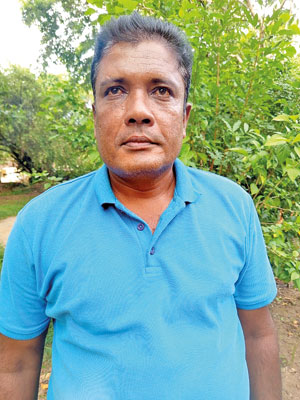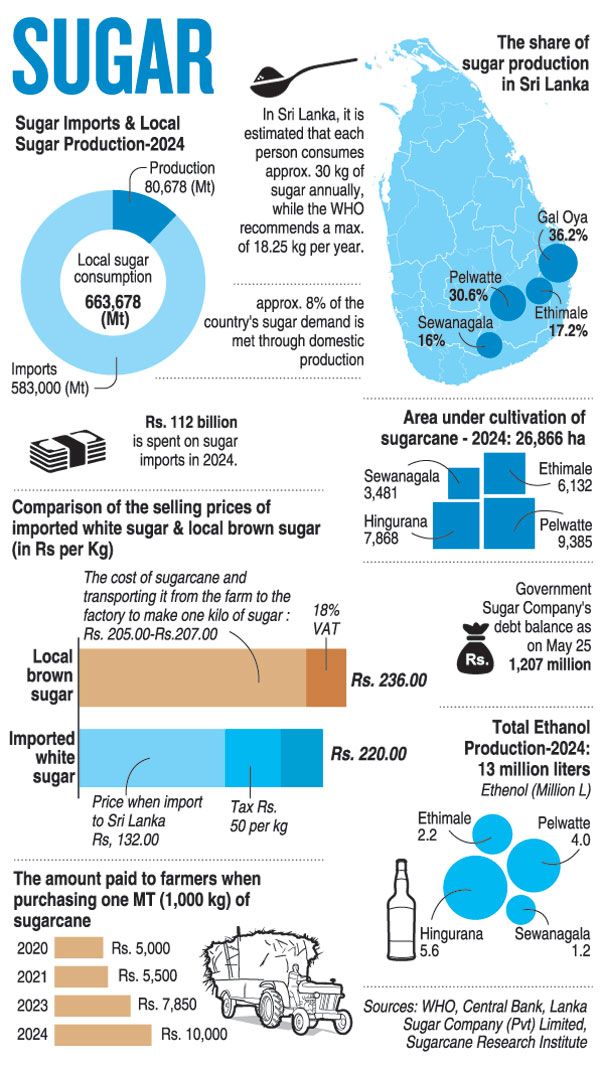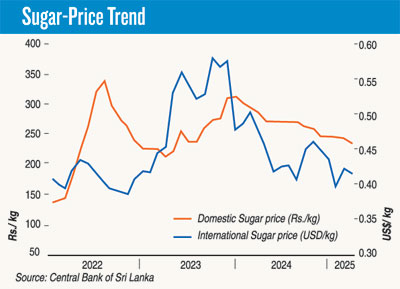News
State-run sugar factories swallowing the bitter pill over brown sugar and ethanol
View(s):
Stacks of unsold brown sugar in a state-run sugar factory warehouse
By Kasun Warakapitiya and Wasantha Chanadarapala
Two state-owned sugar factories have plunged into a financial crisis, which trade unions and employees attribute to a lack of initiative in boosting brown sugar sales.

K.C. Jayashantha
Employees, farmers and officials engaged in the sugar production point out that the government should take policy decisions to improve sales, as currently around 23,000 metric tonnes of brown sugar stocks remain unsold within the two state-run factories.
Employees said the government has not considered the factories’ capability to earn extra revenue by selling the byproducts, such as ethanol, either.
They pointed out that the factories did not make revenue only by selling sugar. But it also earned revenue through ethanol. They called on the government to improve both ethanol production and compost production and earn more revenue.
Trade unionists claimed that the revenue from sugar sales had dropped to such an extent that it had contributed to the delay in the payment of salaries in the Pelwatte sugar factory.
The state-run Lanka Sugar Company controls the Pelwatte and Sewanagala factories, while the Hingurana sugar factory is a semi-government concern. The worst affected are the Kantale and Hingurana sugar factories. The latter had been opened in 2006 after remaining closed for nearly 15 years. At present, it is in a non-operational state. The Kantale sugar factory, on the other hand, had not been operational for 30 years.

Nihal Attanayake
The Sunday Times learned that the sugar factories started earning more revenue during the Gotabaya Rajapaksa government, as it restricted the import of ethanol. This generated a bigger demand for the locally produced ethanol, with a price of a litre soaring to Rs 1200. This enabled the state-run sugar factories to pay a Rs 5,000 bonus to employees. The demand for ethanol, largely from distilleries, also pushed the sugarcane prices up.
After the economic and political crisis in 2022, President Ranil Wickremesinghe, who succeeded President Gotabaya Rajapaksa, imposed an 18 per cent value-added tax and a 2.5 per cent social security levy on sugar products in keeping with the International Monetary Fund guidelines.
This created a price disparity between the imported white sugar and locally produced brown sugar, resulting in consumers choosing imported sugar. Meanwhile imported brown sugar had also aggravated the brewing crisis in the local sugar factories.
The increase in the prices of liquor too affected the sugar industry, as distillery companies reduced production due to the falling demand.
Apart from that, the distillery companies had also opted to use ethanol produced by maize instead of ethanol from sugar factories.
A source told the Sunday Times that the government is prioritising maize cultivation over the sugar industry.
All these factors caused a drop in the price of sugar-factory ethanol from Rs. 1200 a litre to Rs. 500.
Sugar factory employees called for the government’s intervention to secure the local sugar industry. They urged the government to reduce the VAT on brown sugar and impose higher taxes on imported sugar.
Nihal Attanayake, leader of the trade union Uva Ekabadda Podu Sangamaya, pointed out that the sales of locally produced brown sugar had dropped due to excessive availability of imported white sugar for Rs 210.
According to him, the price of brown sugar remains around Rs 195, while its cost of production is around Rs 286 without the 18 per cent VAT and another Rs 2.5 Social Security Levy.

Mr Attanayake attributed the crisis to the factories’ incapability to sell the locally produced brown sugar and ethanol at fair prices.
He called on the government to intervene and either reduce the VAT or impose taxes on imported sugar.
K.C. Jayashantha, Secretary of the Podu Jana Progressive Employees Association, said the Lanka Sugar Company is in a massive financial crisis, and as a result, the employees’ E.P.F. contributions and insurance premiums had not been paid.
According to him, around 4000 employees and as many as 15,000 families are dependent on the local sugar industry; therefore, the government and the subject minister should urgently resolve the crisis in a manner that would secure the livelihood of people engaged in the sugar industry.
Also hit by the crisis are sugarcane farmers. They said it had become increasingly difficult to sell their products to the sugar factories.
B.K. Ranjith, a farmer who used to sell his sugarcane produce to Pelwatte Sugar Factory, said he could not understand what had happened to the industry.
He added he used to supply 1500 tonnes of sugarcane every cultivation season, but now he was finding it difficult to sell his produce to the crisis-hit factories.

Industries and Enterprise Development Minister Sunil Handunnetti said that Rs 112 billion had been spent last year to import 564 million kilograms of sugar and more than Rs 24 million so far this year to import 140 million kilograms of sugar.
The minister said he had learned that brown sugar had been illegally smuggled into the country by some importers of white sugar, and he had instructed the Customs and relevant authorities to take strict action on such traders.
He said the government had decided to suspend the import of ethanol, while the ethanol produced by state-run sugar factories would be sold at Rs 800 a litre to distillery companies.
|
Pelawatte’s COO resigns following social media post criticising govt.  Nuwan Dharmaratne The Pelwatte sugar factory’s Chief Operations Officer, Nuwan Dharmaratne, tendered his resignation last week. He would vacate his post on June 27. In his resignation letter, he noted that the minister had requested him to resign from his post over a comment he had made on social media. Mr Dharamaratne told the Sunday Times he was asked to step down from his post, claiming that he criticised the government. According to him, his social media post was constructive criticism of the government’s move to grow maize on land used for sugar cultivation. “I am fine with the government improving maize cultivation, but that should not hinder the sugar cultivation or local sugar production. If maize is used to produce ethanol, that would directly affect the local sugar industry, as ethanol produced by sugar factories covers costs of sugar production,” he said. | |
The best way to say that you found the home of your dreams is by finding it on Hitad.lk. We have listings for apartments for sale or rent in Sri Lanka, no matter what locale you're looking for! Whether you live in Colombo, Galle, Kandy, Matara, Jaffna and more - we've got them all!

